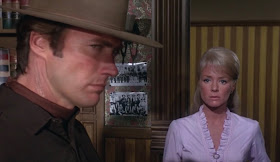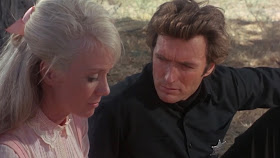In 1967 reporter Jack Ryan met with Inger Stevens in a bar in Utah, where she was shooting the film Firecreek. Inger was playing pool with the locals and holding her own in the game before she sat down to talk with Ryan about her tendency to live a life of solitude. Ryan wrote that "Inger smiles gently and speaks softly so that her ideas don't sound as harsh as they read...Inger's steely self-possession seems far less total, and you wonder whether it may be a thin shield rather than a complete attitude." Here is what Inger shared about her life in the interview:
On being a dancer:
At 16 I ran away to join burlesque. I never thought of it being bad, so, because I didn't think bad, nothing that happened to me was bad. I remember being asked to care for a drunken performer, sick and helpless. People said, "disgusting and shocking." I thought only that he was a sick man; nothing shocked or disgusted me because I could see nothing bad in the world.
On being frugal in spending:
I have no status symbols. Oh, I tore up some rosebushes at home for a sauna bath and pool, but I use them every morning, not just look at them. My Mercedes? Well, I squeezed the dealer down $500 from his bottom price, and my cars last me seven or eight years, so they are hardly luxuries.
About her 2-year marriage to agent Anthony Soglio in the 1950's:
All I wish to say is that it left a lasting impression on me.
On her nearly 3-year battle with Paramount over her contract which ended with Inger going in debt to pay off contracts made by her former husband Anthony Soglio:
It was a nightmare but when it was over, I was a free woman in every sense of the word. I no longer needed anyone. I could laugh at problems that once would have made me so moody that I'd be afraid to be by myself. Now I'm alone a lot. People ask me if I'm lonely. I tell them I have my own small home, and I like its solitude. I have my own Mercedes to take long drives—alone.
On traveling:
My favorite pastime is travel by slow freighters to strange ports—again alone. Am I afraid? Never—well, yes, once I was frightened off from visiting Marrakesh, but maybe I'll still visit it to see for myself. I'm planning freighter voyages to the Orient and the Greek Islands. It's better to travel alone unless you are with somebody very much a part of you, and there's nobody like that in my life. Yes, I'll do that soon. The Greek Islands? No, I'm saving them for my man, whenever I meet him. I'm not so independent to rule out marriage, but he'll have to be somebody you can think and communicate with. I want a marriage we can grow in. When I meet this man—then I'll sail the Greek Islands with him. Until then, I'm saving them. [When Ryan asked "what if he doesn't want to go to the Greek Islands?", Inger smiled and replied, "He will. He will."]We know now that Inger was actually secretly married to producer Ike Jones from 1961 until her death. That marriage, kept secret because it was interracial and would've destroyed Inger's career at the time, was marked with a lot of separations in living arrangements and romantic arrangements and has been described as tumultuous by some. Knowing that Inger and Ike continued to be romantically involved with others and spent much of their marriage estranged, I don't know if Ike was the man she says she's holding out for in the interview. Perhaps, the smiling reply "He will. He will." was a sweet, secret acknowledgment to Ike of their future plans. I have wondered if interviews about her not being married include words or phrases that might not mean anything to the reporter or the public, but were a secret code between Ike and Inger...just my own speculations here. Interestingly, in Ike's obituary, it actually has a small quote about the two traveling. Friend and producer Bob Booker remarked:
They would to go the airport, walk up to the counter and say, ‘When’s the next flight and where is it going?’. They would disappear for a week.I do believe that Inger was a loner throughout her adult life and enjoyed her solitude; she was conditioned to be independent after a traumatic childhood and I think she felt better protected on her own and in control. I'm always pleased to find interviews of hers; I know she is guarding some truths, but she's shedding a good deal of light on her life as well.
Source:
Colker, David. "Ike Jones dies at 84; pioneering African American film producer." Los Angeles Times. October 11, 2014.
Ryan, Jack. "The Lady's a Loner and Likes It." The Kilgore News Herald Sun. August 27, 1967.






















